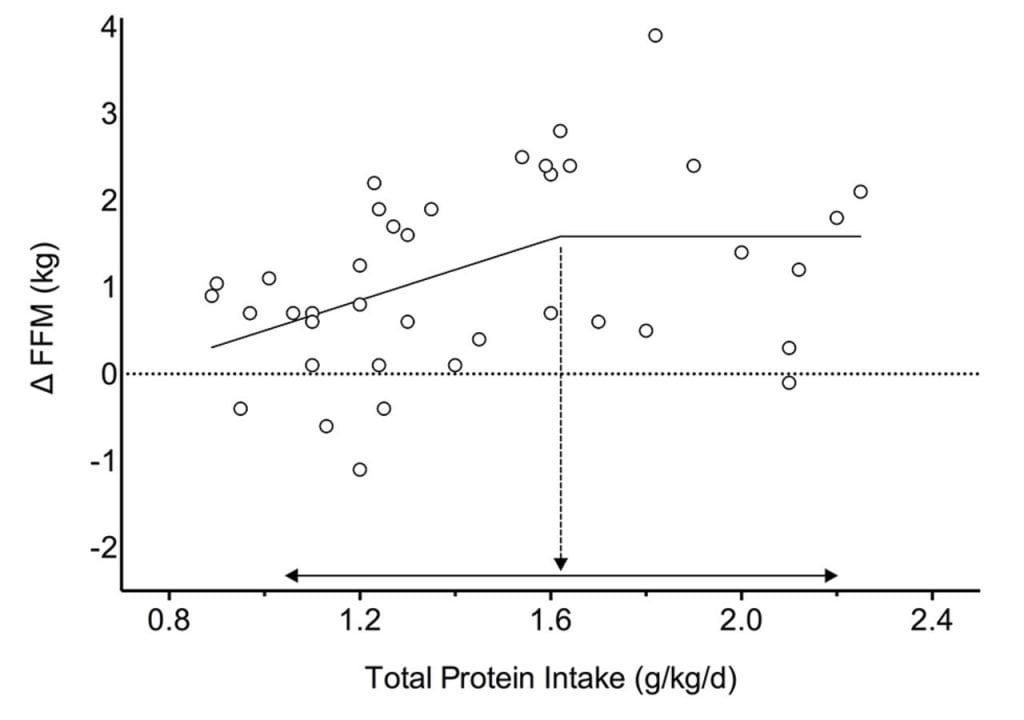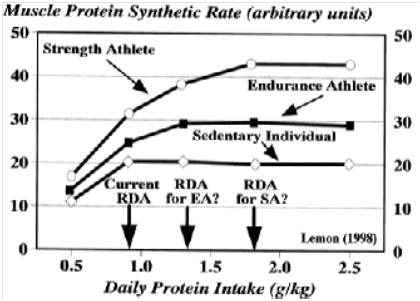"International Society of Sports Nutrition. 1.4 to 2.0 grams/kg body weight/day."
This is a good recommendation for the majority of individual.
"For those performing regular strength training sports 2.3-3.1 grams/kg body weight /day or more may be necessary."
I question if this amount of protein is really necessary. It depends on multiple factors and is iffy.
Amount Of Protein Per Meal
This is one of the most important factors for maintaining and increasing muscle mass.
This based non research by Drs Donald Layman, Layne Norton, Gabe Wilson, etc.
1) Older Individual need to consume around 40 gram of quality protein per meal.
2) Younger individual need to consume about 30 gram of quality protein per meal.
Researchers Point to the Optimal Protein Dose, Timing & Distribution to Maximize Muscle
Cliff Notes Summary
- Muscle protein synthesis is an anabolic response that occurs in response to protein feeding and resistance training. On the protein front, it specifically relates to leucine intake. To maximize the MPS response, ~2.5g of leucine is required. This is known as the “leucine threshold”.
- To maximize the muscle protein synthesis response over the course of a day, it seems that 3–4 evenly spaced meals that surpass the leucine threshold is a prudent strategy.
- A meal containing 0.4 grams of protein per kilogram of bodyweight (g/kg BW) from a high-quality protein source will allow an individual to hit the leucine threshold. For most people this is somewhere between 20–40g.
- The best sources of protein for this purpose are animal proteins (particularly whey protein) due to their high branched-chain amino acid composition. Plant-based protein sources will mean a higher protein intake is needed to hit the required level of leucine.
- When MPS is “spiked” in response to a protein feeding, it will drop back to baseline within 2–3 hours. This drop will occur regardless of whether protein or amino acids continue to be fed and leucine remains high. This is potentially due to high demand of ATP required by cells for MPS (i.e. MPS is an energy-expensive process and the cell will stop MPS to conserve energy).
- MPS is only a proxy measure for muscle hypertrophy, not an exact correlate. Net muscle protein balance (MPS vs. muscle protein breakdown) matters more. And further, there are many other factors than influence actual hypertrophy outside of MPS and MPB.
- Of all the macro nutrients, it seems that timing and distribution (versus simply total daily intake) is most important when it comes to protein. However, there are pragmatic examples of scenarios where we may not theoretically maximize MPS, yet still preserve and/or build plenty of muscle mass. For example, daily intermittent fasting.
Your Diet
Based on your diet, it appears that the only meals you are most likely obtaining enough protein to trigger the anabolic process is lunch and dinner.
Snacks
Research in the International Society of Sport Nutrition by Dr John Berardi determined that smaller, multiple meals/snack do not increase your metabolism. The constant eating blocks body fat from being burned.
Another factor is...
Refractory Period
Drs Layne Norton and Gabe Wison determined that optimal Muscle Protein Synthesis (required for building muscle) is optimized when the right amount of protein (Leucine) is consumed every 4 - 6 hours rather that the dogma of eating protein every three hours.
The muscles are similar to a sponge. When the sponge is soaking wet, it is unable to absorb any more water.
When the sponge is dry, it soaks up a lot of water. Muscle respond in the same way.
Norton and Wilson's research found when the muscles were dry like a sponge after 4 - 6 hours of not consuming protein; optimal Muscle Protein occurred.
Eating protein every three hours amounted to a "Muscle Sponge" still being soaked and unable to absorb protein and optimally trigger Muscle Protein Synthesis.



